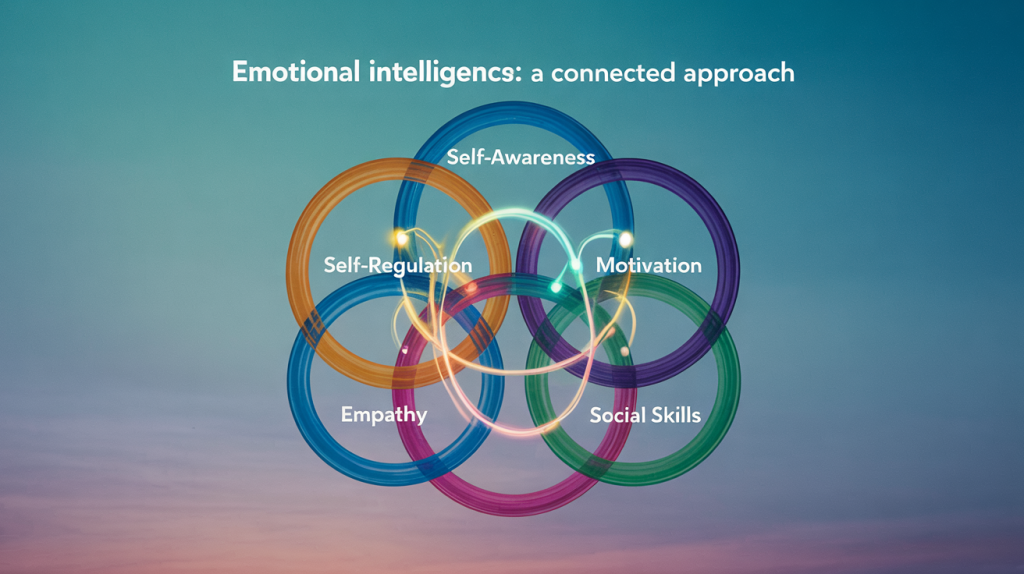EMOTIONAL INTELLIGENCE IS AN INCREASINGLY IMPORTANT COMPONENT, as we work to either harness our emotions or help understand the feelings of those around us in a world of fast-paced and often chaotic dynamics. But while most of us learned how to solve math problems or memorize historical dates, emotional awareness was not usually part of the curriculum.
But this is where the importance of emotional intelligence kicks in—a quality that is not only a foundation for healthy relationships but also personal fulfillment and true success.
“The beauty of emotional intelligence is that it’s not something fixed about us. It’s something we all can do. Learn, strengthen, and use it to build a richer life.”
Then, let’s explore this concept in more depth. Together, we’ll examine what it is, why it matters, and how to cultivate this transformative skill.

![]()
What Is Emotional Intelligence?

For starters, what’s emotional intelligence? The psychologist Daniel Goleman, who popularized the idea, describes it using five main simple components. These are ideas and strategies for living that you could apply in your daily activities.
1. Self-Awareness
Recognizing one’s own emotions
Emotional intelligence begins, above all, with self-awareness. Seeing your feelings as they show has transforming power. That is when you pause to ask, “Wait—why did that upset me?”
People with high emotional intelligence don’t just feel; they know why they think what they feel.
You learn more about yourself when you become more aware of your triggers and emotional patterns. The more you know about these reactions, the more you can take a step back and decide how to treat yourself instead of reacting impulsively.
2. Self-Regulation
Managing emotions in a healthy way
Self-regulation is equally essential. We’ve all had those times when we reacted in anger or did/said something we later regretted. Self-regulation allows us to control those emotional impulses, preventing them from taking control.
This doesn’t mean pretending that you’re not struggling. Instead, it’s about politely expressing your emotions to achieve beneficial outcomes.
The essence of emotional intelligence is realizing your responsibility for how your emotions affect individuals close by.
3. Motivation
Using emotions to pursue meaningful goals
Motivation is another important aspect of emotional intelligence. High EQ achievers aren’t simply chasing paychecks or praise —they’re motivated by purpose.
They’re resilient. When they encounter setbacks, they don’t turn their disappointment into self-doubt. Instead, they reflect, regroup, and give it another go.
Emotional intelligence allows you to transform frustration into fuel and persevere even during dark times.
4. Empathy
Understanding and connecting with the emotions of others
We next come to empathy. Empathy is how we connect with others, not just through words but through being.
It is more than a matter of politeness. It’s about hearing without judging, holding a space, and being able to feel with someone else.
Empathy doesn’t require answers as much as presence.
5. Social Skills
Nurturing healthy, authentic relationships
Social skills bind it all together. Emotional intelligence shows how we communicate, cooperate, and connect.
Strong social skills create trust and rapport when navigating workplace dynamics, resolving conflict in a relationship, or just listening.
With emotional intelligence, relationships don’t just endure — they flourish.
Here is a good audiobook on applying emotional intelligence to social interactions.


![]()
Why Emotional Intelligence Matters

You’re probably wondering: What is emotional intelligence, and why is it a big deal? The truth is, well — it infiltrates all aspects of our lives. Let’s take a closer look.
In the Workplace
Emotional intelligence is vital for career success. If finding a job requires a high IQ, retaining and growing within it requires a high EQ.
Emotionally intelligent leaders foster trust, motivation, and stability under pressure rather than add to it.
They can provide elegant constructive criticism, resolve conflicts with poise, and assess the mood in the room when tensions escalate. Little wonder then that many companies are now prioritizing emotional intelligence regarding hiring and promotions.
In Relationships
Emotional intelligence plays a key role in our relationships. Whether they are romantic partnerships, friendships, or family ties, EQ allows us to relate more deeply to one another and communicate more clearly.
It helps us to be patient when (not if) we disagree, to listen with empathy, and to speak honestly and kindly.
Emotional intelligence teaches us that being ”right” is sometimes less important than compassion.
In Personal Growth
Most importantly, emotional intelligence enables us from within. It helps us heal from painful moments, accept feedback, and create a healthier relationship with ourselves.
With a sense of emotional intelligence, failure is no longer an obstacle to avoid but a lesson to become wiser and stronger.
Nurturing emotional intelligence can make you more agile, centered, and resistant to life’s surprises.

![]()
How to Strengthen Your Emotional Intelligence

Now that we know it’s worth it, the next step is to learn to grow emotional intelligence. The good news is that we can build this skill with thought and practice.
1. Practice Self-Reflection
Regularly taking time for self-reflection is one of the most effective ways to enhance your emotional intelligence. Make it a daily practice to pause and reflect:
- What emotions did I experience today?
- What caused those emotions, and why do we have them?
- How did I respond?
- What could I have done differently next time?
Truthfulness and quiet moments cultivate emotional intelligence. Journaling, meditating, or sitting silently can reveal patterns and provide insight.
2. Cultivate Empathy
Make empathy a mission every day moving forward. Thus, empathy means hearing not to respond but to comprehend.
- Acknowledge parents and children and make eye contact.
- Reflect on what you hear.
- Hold without rushing in to correct.
The more empathetic we are, the more we become connected and emotionally intelligent.
3. Improve Communication
That is the essence of emotional intelligence — it is clear, kind, and difficult. Be direct, but do so with love.
- Show restraint in your words and timing.
- Be aware of body language.
- Be open to feedback, even if you don’t think it through.
Empathy helps us communicate with truth and tact.
4. Manage Stress Proactively
Finally, have effective stress management strategies. Emotional intelligence doesn’t guarantee a smooth journey; it simply equips you with the necessary tools to navigate back to your center.
Try:
- Deep breathing or mindfulness
- Physical movement or exercise
- Establishing boundaries on time and energy
Self-care is not selfish — it’s how you remain emotionally available to others.

![]()
The Ripple Effect of Emotional Intelligence

As your emotional intelligence expands, so will your ability to enjoy life’s highs and lows. You might notice:
- Better, more harmonious, and fulfilling relationships
- Less emotional reactivity and clearer thinking
- More confidence when faced with adversity
- A deepening sense of inner peace and trust in yourself
Emotional intelligence isn’t boisterous—it’s measured, deliberate, and profoundly consequential.

![]()
~ Conclusion ~
The Quiet Power Within of Emotional Intelligence

Emotional intelligence isn’t just a trendy term—it’s a way of living. It calls us to pause instead of react, to lean into compassion instead of control, and to choose growth even when comfort beckons.
Like two hands reaching toward each other but not quite touching, emotional intelligence represents the space between us—where empathy lives, understanding begins, and real human connection is born. It’s not about having all the answers or always saying the right thing. It’s about being present—really present—with ourselves and with others.
“Emotional intelligence is the space where connection begins—soft, unseen, but deeply felt.”
This journey isn’t about achieving perfection. It’s about becoming more human—more aware, intentional, and engaged with the world. When we embrace emotional intelligence, we cultivate deeper connections, a stronger sense of self, and the quiet confidence to lead with heart.
So take that first step. Start small. Observe your feelings. Listen without interrupting. Speak with care. Like those outstretched hands, emotional presence doesn’t always require contact—it simply asks that we reach.
In the end, a more connected, compassionate, and intentional life begins with a conscious commitment to developing emotional intelligence.






